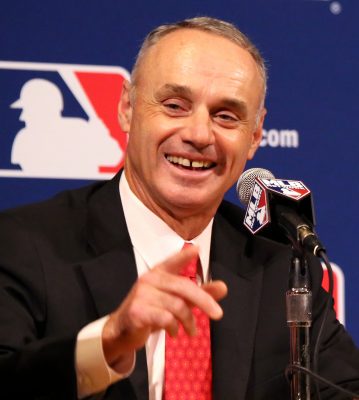
If you’re a baseball fan like me, you’re probably sick of hearing the words “pace of play.” I know I am.
Ever since Rob Manfred took over as Commissioner of Major League Baseball in January 2015, he has made pace of play the cornerstone of his tenure. He instituted changes even before the 2015 season began, prohibiting batters from leaving the batter’s box during plate appearances and installing time clocks to shorten commercial breaks. Heading into 2017, two new rules were added: no-pitch intentional walks and a 30-second limit for managers to decide whether to challenge plays.
I do not like all of these changes. I acknowledge that baseball games are long. According to ESPN, the average MLB game through May 2016 lasted three hours and 26 seconds, just one year after the league tried to speed up pace of play. I can understand those who believe games need to be shortened. However, I cannot support rule changes which fundamentally alter the game itself. Call me a baseball purist, if you must.
One analogy I have heard a lot lately is that baseball is more like chess than checkers. I find this metaphor to be quite fitting. Checkers is a faster-paced, more simplistic game. Chess, on the other hand, takes time and strategy, and ought not to be rushed. Baseball is the only major sport played without a game clock. It is full of hand signals, scouting reports and mound visits. It is intricate, intellectual and deliberate. As the great Yogi Berra once said, “Baseball is 90 percent mental and the other half is physical.”
Sure, stricter rules could be implemented to trim excess time eaten up by pitching changes and instant replay. But when we suggest changing the basics of the sport itself, we have gone too far. When we float proposals like using robots as umpires or beginning extra innings with automatic runners on base, we have lost sight of our mission.
If our goal is to revitalize the game and recapture the love and attention of the American sports fan, then we need to focus more on what happens on the field, and less on how long it takes.
For instance, consider the 2017 World Baseball Classic. If you only watched this year’s WBC, and paid no attention to the MLB, you might have no clue that baseball is struggling. In the WBC, we’ve seen bat flips, exciting late-inning comebacks, surprise teams (can we talk about Team Israel?) and more. We have been blessed with playoff-atmosphere baseball in March.
So what’s different? The answer is not so complicated: the players are having fun. Just take a look at Javier Baez celebrating a play at second base before actually tagging the runner. Or watch the incredible play Adam Jones made to rob his Baltimore Orioles teammate Manny Machado of a home run. Watch the celebrations. The emotion.
Appreciate Adrian Gonzalez and Yadier Molina, two widely respected ambassadors of the game, sounding off against the rules and organization of the tournament. The pattern is clear: people care.
Now, I am not suggesting that the players do not care about the MLB. That would just be silly. But the atmosphere and culture surrounding baseball this past month has been strikingly different. When the players are allowed to have fun and express themselves, everybody wins. If games are five entertaining hours long, nobody will care. Remember Game Seven of the 2016 World Series? That game could have lasted until Christmas and people would have kept watching.
How can we bring this WBC atmosphere back to regular baseball? For starters, the suits over at the commissioner’s office need to remember that baseball is a game more than a business. Their product is real, live, human talent. Their players are their best asset. So instead of getting bogged down in collective bargaining agreements, pitch clocks and offseason qualifying offers, let’s place the focus back on the game and its players.
Devote more time and money to celebrating and promoting baseball’s young stars. Little leaguers worldwide should want to grow up emulating the likes of Mookie Betts, Kris Bryant and Clayton Kershaw. Fans should be hearing more about MVP races and batting titles than pace of play.
Next, let the players express themselves. Let them flip their bats. Let them argue with umpires. Encourage passion and emotion on the field. Give them space to do what they’re best at without fear of punishment or retribution. To put it simply: make baseball fun again.
I fully acknowledge that I am on the losing side of this argument. Rules will keep changing to improve the pace of baseball games. The MLB is going to take the steps it deems necessary to save ratings. I get it.
But as someone who loves baseball, I wish we could spend our time changing the culture of the game, not the rules. Football games are longer and have significantly less action, and nobody says a word. That’s because it is all about engagement, not timing.
I don’t know about you, but I would happily watch a 12-hour baseball game if it meant I could watch Red Sox outfielders #WinDanceRepeat like goofballs afterward. Every time.
So if all it takes to save America’s favorite pastime is some fun, a smile and maybe even a little dancing, then what are we waiting for?










